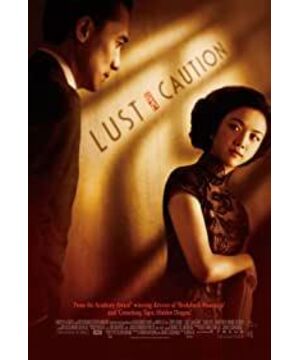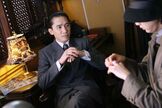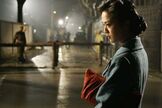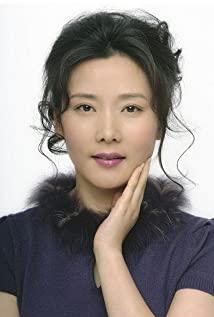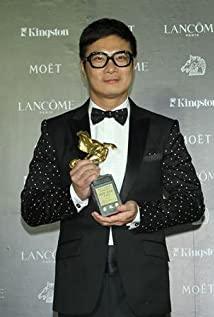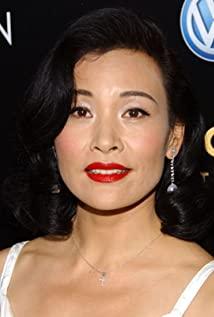The history of rescue "All the dimensions are real, including the license plate of the tricycle and the number on the license plate." Ang Lee said. What I asked was how the old Shanghai street scene in Lust, Caution was filmed. He said his research team put a lot of effort into recreating the old streets of Shanghai. "What about the building materials?" "It's also true." I already thought it was incredible, but I asked again: "But are the two rows of plane trees on the street real?" "One tree is planted one by one." Li An Say. He reminded me to look at the desk in Mr. Yi's office the second time around. He has been looking for a table in the Republic of China for a long time, because there is no such thing in the mainland. All the stationery on the table, including a cup, took a lot of work to find. "Did you notice there's a big statue on the back of Mr. Yi's desk?" Huh? No. "It's Zhong Kui. Every spy will keep a Zhong Kui in the office." Ang Lee is not just faithful to Zhang Ailing's original novel, he is trying to be faithful to a piece of history that has been wiped out. The back alley where Mr. Yi entered and exited was really the back alley of Li Shiqun, one of the spy chiefs of No. 76 back then. How was it shot in Hong Kong? The old streets of Hong Kong have been completely demolished. How did the footage of college students riding the tram that looks like Des Voeux Road in Central come from? "That's Penang and Ipoh. The street houses there are the same as in old Hong Kong, but they are well preserved, except that the roof in Malaysia is sloping, so some computer processing is needed." "How did the tram come?" "Specially. It's a real tram." The part where the students acted was filmed in the Luk You Hall of the University of Hong Kong. The buildings of the 1910s, standing on the top of the hill, are still graceful. During the filming of the students acting, Ang Lee felt goosebumps all over his body, because everything in the film was what he experienced when he first performed a drama at the Taipei National Academy of Arts: the stage of the university auditorium, the innocent young students, I found my own unique experience from acting. After the performance, everyone excitedly went to eat supper, and it was raining lightly on the empty street... Li An was narrating, I looked into his eyes, big eyes, warm, Sincere, but profound. There are several layers of life and stories overlapping here: 20-year-old Ang Lee and 20-year-old Wang Jiazhi and Kwong Yumin, former young actor Ang Lee and current young actor Tang Wei. Once upon a time and now, inside and outside the play, script and life are intertwined. When looking for Mr. Yi's desk, what came to Li An's mind was "the kind of desk that my father would use when I was a child". What "Lust, Caution" is looking for is the movies that my father could watch, the songs that he could hum, the clothes that he could wear, the books that he could put on the bookshelf, and the accent of the Republic of China. Tang Wei, who speaks Mandarin in the Beijing accent, had to switch classes to learn the southern Mandarin. Tony Leung, Leehom Wang, and Tang Wei took three months of classes. They had to read "Weiyang Song" and "Blue and Black", to watch "The Stars, Moon and Sun" starring You Min, to listen to popular music at that time, and to read Dai Li and Hu Lancheng. It is necessary to be familiar with every word in Eileen Chang's works, and to enter into a deep and complete historical situation. Deeply "immersed" in that historical situation, Ang Lee said, after filming, he almost felt "possessed". "It was Zhang Ailing's work that came to me, not me. This history is meant to be left behind." "But people of their age are too far away from that era." It seemed that his mouth was dry, he drank it. I took a sip of tea and continued, "Our generation still knows a little bit. If our generation doesn't make this movie, it will never be possible in the future." I looked at Ang Lee. This is the Four Seasons Hotel in Central, Hong Kong. It was close to 11pm when I suddenly discovered what "Lust, Caution" is. It is Ang Lee's personal "rescue history" operation. Perhaps it was the contradiction of human nature in Eileen Chang's novels that attracted him, maybe it was Eileen Chang's deviant values that touched him, and maybe it was the film style of the novel that inspired him, but it was a very personal reason that made him " An anthropologist's spirit of seeking proof and a "historian"'s precise attitude to "implement" Eileen Chang's novels, and make the history of the Republic of China in the 1940s, including its spiritual outlook and material life, as realistic as a documentary. record it. He is very conscious that this part of the history of the Republic of China is only an invisible edge in Hong Kong. It has long been buried and buried in the mainland. In Taiwan, it is gradually removed, forgotten, and abandoned. If he does not do it, this part may sink forever. He is rescuing a fading history of which he is a part. "The part of the drama troupe was filmed at Youtang in Hong Kong. Do you know who Lu You is?" He shook his head. "Do you remember that in the 53rd year of the Republic of China, a plane fell down near Taichung due to hijacking, and fifty or sixty people died. Many important figures in the film industry, there was a person named Lu Yuntao?" "Of course I do," said Ang Lee. , "He is the founder of Dianmao Film, and "The Stars, Moons, Sun" belongs to him. He came to Hualien first, and also Lei Zhen and Zhao Lei. I was nine years old and took pictures with them, which was very impressive. " "Lu You, is Lu Yuntao's father." Ah...he stopped talking, but we may all be thinking the same thing: many clues in history, seemingly unrelated to each other, will suddenly appear when you are unprepared. Emerge as if it found you. In 1939, Eileen Chang came to the campus of the University of Hong Kong with a large suitcase, and Xu Dishan was her department head. When the war broke out, she worked as a student nurse in Lu Youtang's temporary hospital. The innocent-looking female student had a human X-ray camera hidden in her heart, snapping pictures of the desolation of the world. Zhang Ailing, a girl in her twenties, expected that in Lu Youtang 70 years later, there would be Ang Lee trying to restore her faded film?
2. Sex is in despair The sex scene was so real and thorough that I was in awe of the two actors, but if the actors had not had the utmost trust in the director, such an unreserved performance would not have been possible. How did Ang Lee convince the actors that intense and direct sex was necessary in this film? I believe its necessary. The reason why Zhang Ailing's "unsightly" novel is shocking is mainly because the novel violates the secular values of black and white and unclear loyalty and guilt. Ordinary writers deal with the stories of female agents and traitors, and inevitably they have to write about the heroism of female agents and the abhorrence of traitors. Zhang Ailing's female spy has harmed state affairs because of an affair, Zhang Ailing's traitor is not so clearly hateful, she looks "pale and beautiful", the closest description is a bit pitiful: "The smile at this moment is not at all. Not ironic, but a little sad. His profile, facing the lamp, looking down, his eyelashes like beige moth wings resting on his thin cheeks, seemed to her a kind of tender pity." More The "serious" thing is that the reason why the female agent is emotional is not the pure love in ordinary romance novels, but sex. "The truth is, every time I'm with Lao Yi, it's like taking a hot bath to wash away the depression, because everything has a purpose." Conquering a man through his stomach, "the way to a woman's heart Through the vagina." If Wang Jiazhi betrayed her comrade, it was because of her pure love, and she might be forgiven or even beautified by the world, but it was because of the enjoyment of sex that she had love and betrayed the righteousness. It is the real deviant that is the real tension of the novel. "In the end, her feelings for him were so strong that it had nothing to do with anything, just feelings. They were the original relationship between hunter and prey, between tiger and scorpion, and the ultimate possession." In terms of power control, Mr. Yi is the "hunter" and Wang Jiazhi is the "prey"; in terms of the release of the flesh, Wang Jiazhi may be the "hunter" and Mr. Yi is the "prey". Because there is such a strong "lust", there is a dangerous and chilling "precept". Mr. Yi put a "ring" on Wang Jiazhi's finger. Whether Mr. Yi gave the "ring" to Wang, or Wang was the "ring" of Mr. Yi, I am afraid it is a dialectical relationship and a chain. What is the relationship between "Tiger" and "Yuan"? What is the relationship between "弥" and "prostitute"? In the novel, sex is written obscurely, but Eileen Chang seems to have written a director's instruction to Ang Lee: "The way to a woman's heart is through the vagina", which is a director's instruction written next to the script. The director fully sees the key role of sex in this play, and all the dramatic contradictions and tensions actually originate from here. Ang Lee's handling of sex is very precise. The tyranny of the first sex scene could be criticized for being uncreative, as experts would point out, such sexual tyranny was often seen in Nazi films to underscore the "power is an aphrodisiac" theme. However, in the subsequent bed scene, the two people's bodies were twisted and rubbed to the extreme, and their expressions were extremely controlled and tense, which fully showed their attitudes towards themselves and their fate: Mr. Yi had a bad premonition about the war and knew that Your future is in jeopardy. Wang Jiazhi was even walking on the hot mountain of knives, with her life in her hands. The expressions of the two, there is a look of despair, sex is the only redemption and last-ditch effort for the desperados; plus the world outside the bed is a wolf dog and a pistol, assassination and torture, rainy, "lust" and "Ji" did the sharpest confrontation here, and Ang Lee pulled the tension of the drama to the edge of breaking. Zhang Ailing once loved Hu Lancheng deeply, and Hu Lancheng once hurt Zhang Ailing. How deep is Zhang Ailing's love and hatred for "traitor" Hu Lancheng? I dare not say it, but in "Lust, Caution", Wang Jiazhi has so many shadows of Zhang Ailing, and Mr. Yi can't help but think of Hu Lancheng. "Lust, Caution" will let Zhang Ailing scribble and scribble for 30 years, and finally write it out. It is a hidden thing that is much more than revealed, too much speechless, too much vague, too complicated emotions. The attitude is too ambiguous. Judging from the history when she was accused of being a "traitor and literati" when she first debuted in the 1940s, "Lust, Caution" may really be a work that hides the most emotional entanglement of Eileen Chang. "Lust, Caution", on the surface, seems to be a story about Zheng Pingru and Ding Mocun, but in fact, the dark and dark psychological world, the relationship between love and hate, "hunter and prey", "tiger and duck", Where is the "Ultimate Possession" written by Zheng Pingru and Ding Mocun? Li An said that when he asked Tony Leung to try to figure out Mr. Yi's role, he asked him to combine the characteristics of Ding Mocun, Li Shiqun, Hu Lancheng and Dai Li. Tang Wei plays the overlap of Wang Jiazhi and Zhang Ailing. Sex can perform such an artistic depth, Bravo, Ang. Zhang Ailing once loved Hu Lancheng deeply, and Hu Lancheng once hurt Zhang Ailing. How deep is Zhang Ailing's love and hatred for "traitor" Hu Lancheng? I dare not say it, but in "Lust, Caution", Wang Jiazhi has so many shadows of Zhang Ailing, and Mr. Yi can't help but think of Hu Lancheng. "Lust, Caution" will let Zhang Ailing scribble and scribble for 30 years, and finally write it out. It is a hidden thing that is much more than revealed, too much speechless, too much vague, too complicated emotions. The attitude is too ambiguous. Judging from the history when she was accused of being a "traitor and literati" when she first debuted in the 1940s, "Lust, Caution" may really be a work that hides the most emotional entanglement of Eileen Chang. "Lust, Caution", on the surface, seems to be a story about Zheng Pingru and Ding Mocun, but in fact, the dark and dark psychological world, the relationship between love and hate, "hunter and prey", "tiger and duck", Where is the "Ultimate Possession" written by Zheng Pingru and Ding Mocun? Li An said that when he asked Tony Leung to try to figure out Mr. Yi's role, he asked him to combine the characteristics of Ding Mocun, Li Shiqun, Hu Lancheng and Dai Li. Tang Wei plays the overlap of Wang Jiazhi and Zhang Ailing. Sex can perform such an artistic depth, Bravo, Ang. Zhang Ailing once loved Hu Lancheng deeply, and Hu Lancheng once hurt Zhang Ailing. How deep is Zhang Ailing's love and hatred for "traitor" Hu Lancheng? I dare not say it, but in "Lust, Caution", Wang Jiazhi has so many shadows of Zhang Ailing, and Mr. Yi can't help but think of Hu Lancheng. "Lust, Caution" will let Zhang Ailing scribble and scribble for 30 years, and finally write it out. It is a hidden thing that is much more than revealed, too much speechless, too much vague, too complicated emotions. The attitude is too ambiguous. Judging from the history when she was accused of being a "traitor and literati" when she first debuted in the 1940s, "Lust, Caution" may really be a work that hides the most emotional entanglement of Eileen Chang. "Lust, Caution", on the surface, seems to be a story about Zheng Pingru and Ding Mocun, but in fact, the dark and dark psychological world, the relationship between love and hate, "hunter and prey", "tiger and duck", Where is the "Ultimate Possession" written by Zheng Pingru and Ding Mocun? Li An said that when he asked Tony Leung to try to figure out Mr. Yi's role, he asked him to combine the characteristics of Ding Mocun, Li Shiqun, Hu Lancheng and Dai Li. Tang Wei plays the overlap of Wang Jiazhi and Zhang Ailing. Sex can perform such an artistic depth, Bravo, Ang.
3. Looking at the breeze on the lake The instant popular charm of the movie is really not comparable to the slow stew of literature. Zhang Ailing's "Lust, Caution" is a relatively little-known short story; if you don't know the historical background, the obscure and rough brushwork of the novel itself makes it difficult for ordinary readers to get started. Ang Lee's movie, however, falls from the sky like a big, menacing fireball, sparks splattering as it falls, making a chi chi sound, the effect is that everyone is talking about "Lust, Caution", a cool novel It was also hot from being rubbed by people's hands and mouths. Mr. Yi, the traitor and villain in the novel, was criticized by critics when "Lust, Caution" was published because he was not handled "badly" enough in the novel. At that time, I couldn't help laughing when I read "The Outsiders"'s criticism of Eileen Chang. Didn't Hu Lancheng say about Eileen Chang's personality a long time ago? In "The Republic of China Woman", he looked at the 23-year-old her like this: "I am not used to all kinds of Aileen. She has never been sympathetic to others, has no sympathy for anyone, she has no mercy and charity, and there is no exaggeration in her world. No one is wronged. She is very selfish, and she is cruel and ruthless." He added, "Aileen is very strict with good people and good things, but she is only strict with villains and ordinary things. She is really equal." , Isn't the most shocking and profound part of Eileen Chang's literary works her very special and rare "unsympathetic" cool eyes? If Zhang Ailing had the "loyalty and traitor consciousness" of ordinary people, she probably would not have married the famous "traitor and literati" Hu Lancheng at the age of 23. Mr. Yi is not "bad" enough in the novel. Apart from Eileen Chang's own cognitive value and character, and the extremely deep and lingering love between her and Hu Lancheng, I see an angle that is rarely mentioned, that is: In addition to novels and movies, "Mr. Yi" in the history of the Republic of China is not necessarily a "bad person" with many "bad". Mr. Yi's "prototype", Ding Mocun, was born in 1903. Because of Chen Lifu's recommendation, he became the director of the third division of the Bureau of Investigation and Statistics. After the third division was cancelled, he joined Wang Jingwei's government and held important positions. On the eve of the end of the Sino-Japanese War, he was the "pseudo-Governor of Zhejiang Province". On May 1, 1947, Ding Mocun was shot to death on the charge of "conspiring with the enemy country and conspiring against the country". The verdict listed many crimes, including "the chief envoy killed the underground staff of the Military Statistics Bureau and the former president of the Jiangsu High School Second Court, Yu. Hua, and Zheng Pingru, who participated in the work of the Central Bureau of Statistics..." With such a "traitor" resume, shouldn't his death penalty be taken for granted? Not so simple. In the snowy night in Germany, I read the transcripts of interrogation of traitors, judgments, letters, telegrams, notes, etc. as evidence in the Nanjing Archives, and slowly I saw the outline of a story. The real life revealed by the dusty historical materials is so tortuous that it almost feels like flesh and blood, and its subtle pain, irony and cruelty do not need to be borrowed from the hands of writers. One year after Zheng Pingru was secretly executed for his attempted assassination of Ding Mocun, in 1941, Chen Lifu, then the Minister of Education of the Nationalist Government, secretly got in touch with Ding Mocun, who was promoted by him and is now a Wang puppet. The younger generation of the regime's spy chief, "Xiaoyi Dayi", instructed him to try to "break out of the pseudo-area". Chen Lifu's "rebel" was successful. In the following years, Ding Mo Village was ostensibly the Minister of Transportation and Welfare of the puppet government. In private, he set up a radio station and provided information for Dai Li's Military Statistics Bureau, and cooperated with Zhou Fohai in an attempt to assassinate the then. Li Shiqun, one of the spy chiefs, cooperated with Dai Li's instructions to continuously rescue the arrested Chongqing underground staff. These rescued intelligence officers also testified in letters in the trial court, and the cooperation between Ding Mocun and the Chongqing government is beyond doubt. After the defeat of Japan, the situation was chaotic. In order to prevent the Communist Party from taking the opportunity to gain power and the rise of new warlords, the Chongqing government timely and effectively used the chess piece of Ding Mo Village. He was appointed by the government as "Zhejiang Provincial Military Commissioner". This time, there is no "pseudo" in front of "Zhejiang". I read Dai Li's handwritten letter to "My Brother Mocun". Dai asked Ding to "take full control of his department, maintain local law and order, strictly prevent bandits from disturbing, and ensure that the central army can receive it safely" in the midst of chaos and danger. And Ding Mocun did implement Chongqing's orders one by one. Before the central troops entered Zhejiang, the "traitors" had already occupied half of the western part of Zhejiang. It was only after the "suppression of bandits" in Dingmo Village that the central troops took over Zhejiang steadily. Reading history in the middle of the night, I rubbed my eyes, perplexed. Then this Ding Mo Village is equivalent to a surrendered general who was successfully recruited by the Nationalist government. This surrendered general never returned to the "Han Army" to fight, but he stayed in the "Cao Ying" to secretly cooperate and be one of the apples. A worm is like a spy planted by the Nationalist government in the enemy camp. How dangerous is his situation and how important is his credit. In war, hidden spies play no less role than blood-drenched warriors, don't they? When the Chongqing government needed the assistance of Ding Mo Village, both Chen Lifu and Dai Li had promised him: Chen Lifu promised that Ding could "make a crime and perform meritorious deeds, and he should first show the facts, and then transfer it to the commissioner on his behalf to surrender or reform himself." Dai Li said it more clearly: "My brother can be responsible for petitioning the committee for protection." Well, why did the Nationalist government kill the "submissive generals" and "spies" who had served it well after the victory? Especially after the specific guarantee not to kill has been given? The problem lies in the "commission seat" - Chiang Kai-shek? While confused, Chen Lifu's memoir was published. So Feidian asked friends to "send the "Memoirs of Chen Lifu" to Europe as soon as possible. A week later the book arrived, and the postman came out of the snow with fine white snow still sticking to his beard. I took the book from him, unpacked it, and read it almost in the slight snow. I actually found the answer. "Chen Lifu's Memoirs" p. 232: Ding Mocun could have survived, but one day he fell ill and went out to see a doctor in prison. He came out of the Nanjing Detention Center and visited Xuanwu Lake by the way... This news was read by Chairman Jiang. After that, Chairman Jiang said angrily: "How can you swim in Xuanwu Lake when you are sick? You should be shot!" Ding Mocun was shot. Just because he came out of prison and wanted to see a little breeze on the lake, he was recognized by a small newspaper reporter and wrote it in the newspaper. Ah, I can't help but sigh. No wonder Ding Mocun's death sentence reads so eloquently, completely ignoring all the strong evidence in black and white that Ding Mocun put forward to defend his life. It turned out that what sentenced him to death was not a real court at all, nor was it a real law. In such an era, shouldn't you leave a little space for human nature to the so-called "loyal and traitor", whether it is Mr. Yi or Mr. Ding, whether it is Zhang Ailing or Hu Lancheng? "Chen Lifu's Memoirs" p. 232: Ding Mocun could have survived, but one day he fell ill and went out to see a doctor in prison. He came out of the Nanjing Detention Center and visited Xuanwu Lake by the way... This news was read by Chairman Jiang. After that, Chairman Jiang said angrily: "How can you swim in Xuanwu Lake when you are sick? You should be shot!" Ding Mocun was shot. Just because he came out of prison and wanted to see a little breeze on the lake, he was recognized by a small newspaper reporter and wrote it in the newspaper. Ah, I can't help but sigh. No wonder Ding Mocun's death sentence reads so eloquently, completely ignoring all the strong evidence in black and white that Ding Mocun put forward to defend his life. It turned out that what sentenced him to death was not a real court at all, nor was it a real law. In such an era, shouldn't you leave a little space for human nature to the so-called "loyal and traitor", whether it is Mr. Yi or Mr. Ding, whether it is Zhang Ailing or Hu Lancheng? "Chen Lifu's Memoirs" p. 232: Ding Mocun could have survived, but one day he fell ill and went out to see a doctor in prison. He came out of the Nanjing Detention Center and visited Xuanwu Lake by the way... This news was read by Chairman Jiang. After that, Chairman Jiang said angrily: "How can you swim in Xuanwu Lake when you are sick? You should be shot!" Ding Mocun was shot. Just because he came out of prison and wanted to see a little breeze on the lake, he was recognized by a small newspaper reporter and wrote it in the newspaper. Ah, I can't help but sigh. No wonder Ding Mocun's death sentence reads so eloquently, completely ignoring all the strong evidence in black and white that Ding Mocun put forward to defend his life. It turned out that what sentenced him to death was not a real court at all, nor was it a real law. In such an era, shouldn't you leave a little space for human nature to the so-called "loyal and traitor", whether it is Mr. Yi or Mr. Ding, whether it is Zhang Ailing or Hu Lancheng?
View more about Lust, Caution reviews


